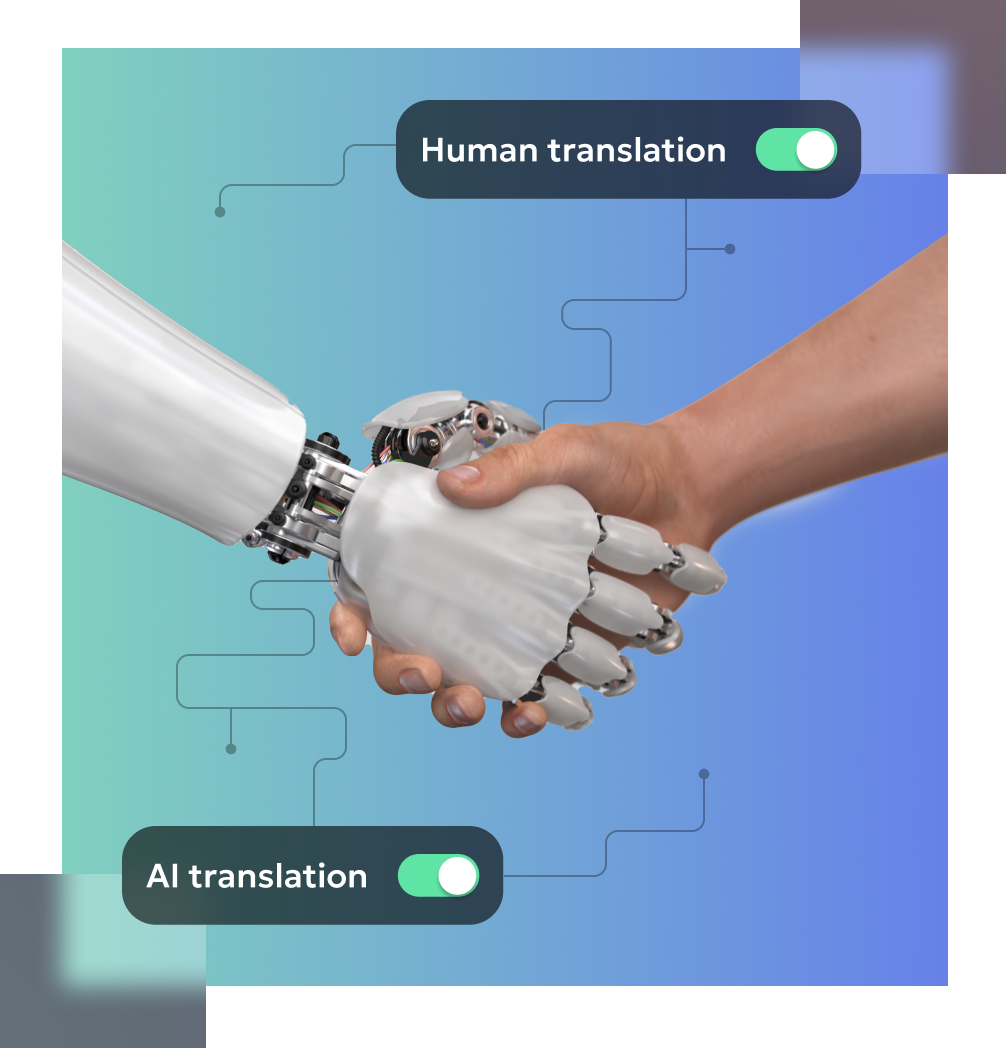MAGMA Translation Services
Literary Translation: Bringing Stories to Life
Experience the magic of literary translation as we transform your narratives into captivating stories that resonate across cultures and languages.

MAGMA Translation Services
Experience the magic of literary translation as we transform your narratives into captivating stories that resonate across cultures and languages.

AI enhances the translation process by providing quick and accurate text analysis.
Human translators add cultural nuances and emotional depth to the narrative.
Together, they create translations that resonate with diverse audiences.
This synergy ensures that stories maintain their original essence while reaching new readers.

AI tools streamline repetitive tasks, allowing translators to focus on creativity.
Machine learning algorithms adapt to various writing styles and genres.
The combination of technology and human insight leads to richer storytelling.
Literary translation becomes a collaborative art form, bridging gaps across languages.
Magma Translation offers expert literary translation services that ensure your stories resonate across cultures. Our skilled translators bring your narratives to life with precision and creativity.
Expert Translators
Our team consists of native speakers with literary expertise, ensuring authentic translations.
Cultural Sensitivity
We understand cultural nuances, making your stories relatable to diverse audiences.
Timely Delivery
We respect deadlines, delivering high-quality translations on time, every time.
Personalized Service
We tailor our services to meet your specific needs, ensuring satisfaction with every project.
Competitive Pricing
Our pricing is transparent and competitive, providing value without compromising quality.
At Magma Translation, we pride ourselves on our diverse clientele. Our clients range from authors and publishers to businesses and organizations, all seeking to bridge language barriers and share their stories with the world.





Our quality estimation process ensures that every literary translation captures the essence and nuances of the original story. By focusing on cultural context and linguistic accuracy, we bring narratives to life across different languages.
What Our Clients Say
Hear from our satisfied clients about their experiences with our literary translation services. Their stories reflect our commitment to quality and excellence.
5 stars | Over 100 positive reviews
“Karl R. - The translation from Romanian to English was seamless. The nuances of the original text were preserved beautifully, making the story come alive in a new language. Highly recommend!”
Karl R.
Romanian to English
“Ed N. - I was impressed with the quality of the Russian to English translation. The translator captured the essence of the characters and the plot, making it an enjoyable read. Fantastic service!”
Ed N.
Russian to English
“Laura D. - The English to Spanish translation exceeded my expectations. The translator's attention to detail and cultural context made the story resonate with Spanish-speaking readers. Truly exceptional work!”
Laura D.
English to Spanish
“Miguel T. - I needed a Portuguese to English translation for my novel, and the service was outstanding. The translator understood my voice and style, delivering a polished final product. Very satisfied!”
Miguel T.
Portuguese to English
“Sophie M. - The French to English translation was done with great care. The translator not only translated the words but also the emotions behind them. I couldn't be happier with the result!”
Sophie M.
French to English
“Jamal H. - I was amazed by the Arabic to English translation quality. The translator's expertise brought my story to life in a way I never thought possible. Highly recommend their services!”
Jamal H.
Arabic to English
“Anna B. - The German to English translation was flawless. The translator's understanding of both languages ensured that the humor and subtleties were perfectly conveyed. Excellent work!”
Anna B.
German to English
“Luca V. - I had a wonderful experience with the Italian to English translation. The translator was professional and attentive, making sure every detail was captured. I will definitely use their services again!”
Luca V.
Italian to English
“Yuki N. - The Japanese to English translation was exceptional. The translator's skill in conveying cultural nuances made my story accessible to a wider audience. I am very grateful for their help!”
Yuki N.
Japanese to English


Experience the magic of literary translation with our AI technology, designed to bring stories to life while maintaining the essence and emotion of the original text. Enjoy seamless translations that resonate with readers across cultures and languages, ensuring your narrative transcends borders effortlessly.
Embracing New Horizons in Storytelling
Literary translation fosters cultural exchange, allowing diverse narratives to resonate across borders and connect readers with different perspectives and experiences.
Advancements in technology and creative approaches are enhancing literary translation, ensuring that the essence of stories is preserved while reaching wider audiences.
By translating literature, we empower voices from various backgrounds, enabling their stories to inspire and engage readers globally, transcending language barriers.
Literary translation is an art that transcends language barriers, allowing stories to resonate with diverse audiences. Our services ensure that your narrative maintains its essence while reaching new readers worldwide.
Our team of skilled translators specializes in literary works, ensuring that the nuances and emotions of your story are preserved. We understand the importance of cultural context in every translation.
We go beyond mere translation by adapting your narrative to fit different cultural contexts. This approach enhances relatability and engagement, making your story accessible to a wider audience.
Every translated piece undergoes rigorous quality checks and editing processes. Our commitment to excellence guarantees that your story is not only translated but also polished to perfection.
We believe that every story deserves to be told. Our passion for literature drives us to bring your narrative to life in multiple languages, ensuring it resonates with readers everywhere.

Utilizing AI in literary translation not only enhances accuracy but also reduces costs, allowing you to invest more in your storytelling journey. Experience the seamless blend of technology and creativity as your narratives transcend linguistic barriers effortlessly.

10,000+
Projects Completed
100k+
Satisfied Clients
116+
Countries Served
7,000,000+
Words Translated Annually
With over 10,000 successful projects completed, our translation services have reached a global audience. We proudly support over 100,000 satisfied clients across 116 countries, translating more than 7 million words annually.

ATA Corporate member #263976 since 2015

Accredited with an A+ rating from the BBB

21K+ 5-star verified customer reviews
Our dedicated team of expert translators ensures that your documents are translated accurately and efficiently, catering to various needs such as legal, academic, and personal documents. We prioritize quality and affordability in every project.
Magma Translation was founded with a simple goal: to make high-quality document translation fast, affordable, and hassle-free.
Today, that mission is powered by a close-knit team working across product, operations, support, fulfillment, and translation.
Together, we make Magma the trusted choice for customers around the world.

Mike
Head of Operations

Anthony
Head of Product

Andrew
Senior Developer

Kathy
Translation Manager

Alejandra
Support Manager

Ashley
Support

Mark
Fulfillment

Jacs
AI Engineer

Lina
QA Specialist

Carlos
Business Development

Emma
UX Designer

Victor
Data Analyst

Isabelle
Marketing Coordinator

Daniela
Legal Advisor

Sofia
Customer Success

Raj
Security Engineer

Nina
Finance Manager

Lucas
Content Strategist
Explore our tailored AI plans designed to meet your needs. Whether you're a beginner or an expert, we have the right solution for you.
Ideal for individuals starting their AI journey. Access essential features and support.
Perfect for professionals seeking advanced features and enhanced support for their projects.
Comprehensive solutions for large organizations with tailored features and dedicated support.
Our translators are not only fluent in languages but also understand cultural contexts, ensuring your story resonates with diverse audiences.



